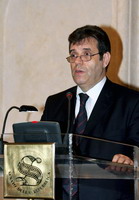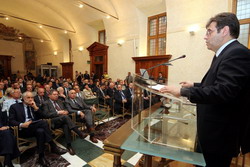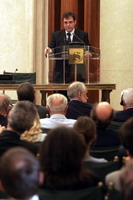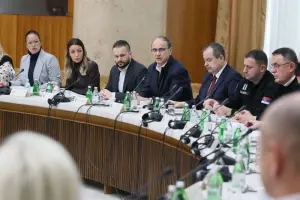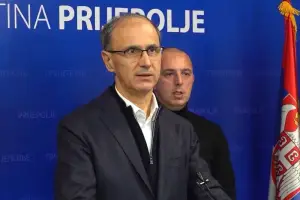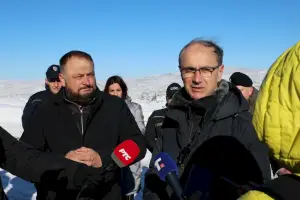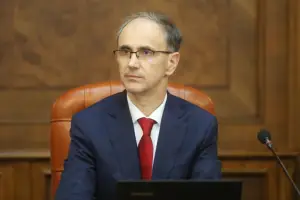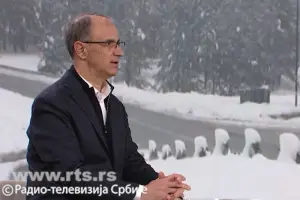Q:
A:
Kosovo problem serious test for European Union
Belgrade,
7 June 2005
Serbian Prime Minister Vojislav Kostunica said today in the Italian Senate that the monitoring of implementation of all eight groups of standards in Kosovo-Metohija undoubtedly confirms that none of them can be given a positive assessment. He stressed that the province's problems today are not only the major challenge for the state policy of Serbia-Montenegro, but also a serious test for the common foreign and security policy of the European Union.
The official web site of the Serbian government brings the full speech of the Serbian Prime Minister.
Address by Prime Minister of the Republic of Serbia Vojislav Kostunica before the Senate of the Republic of Italy
Rome, June 7, 2005
Mr. President, Your Excellencies, Ladies and Gentlemen, Distinguished Senators,
It is an honour for me to address you as your glorious ancestors did: Patres et Conscripti. The Roman Senate, whose ancient tradition you worthily carry on, was the source of the eternal values of patriotism and rule of law. These values, which gave rise to our civilisation and sustained it, the values that it still depends on, are living today through the concept and practice of European integration.
The European Union is by all means the peak of the European integration processes, as a group of equal nations and states, each bringing in its own distinguished features and qualities, without stopping to develop national integrity and care about the future of its own. Having learnt from bad, even catastrophic experiences from the recent and distant past, the European nations have realised that they can ensure a safe future through a community based on the principles of freedom and rule of law. The united Europe has thus become the supreme guarantor of both the safety and economic prosperity of all European nations.
Italy’s contribution to these processes is enormous. Having co-founded the European Coal and Steel Community as the first European integration organisation in 1951, and signed the foundation treaties for another two in 1957 – the European Economic Community and the European Atomic Energy Community – Italy has played a vital role in developing and improving the integration processes ever since. This country was among the first member nations to support the promulgation of the European constitution by ratifying the Treaty Establishing the Constitution of Europe, making it clear that it was interested in the uppermost levels of European integration. After the latest developments, it is difficult to say what is going to happen with the European Constitution as a supreme legal document for the European Union, but at least it is clear that even if no progress is made in the near future, no retrograde steps will be made either. The European integration processes have always developed unevenly, held up by crises and delays. Remember “the empty chair crisis” in mid-sixties, or stagnation in the second half of the 1990s. As they failed to undermine the previous integration achievements, I am certain that the great idea of the Union will overcome the challenges arising from the decision by the majority of the French and Dutch people to reject the proposed European constitution.
My country, the State Union of Serbia and Montenegro, does not share the dilemma with the member states and citizens of the European Union because, simply, is hasn’t joined the European Union as yet. It goes without saying, however, that we are determined to join the European integration processes, with a view to full membership of the Union. To be more specific, this is not just an objective, but a living process that we are already involved in. In March this year, the European Commission decided to grant Serbia and Montenegro a positive assessment of the feasibility study for the state union, and the Council of Ministers verified the document, allowing for the talks on the Stabilisation and Association Agreement for Serbia and Montenegro to begin.
Serbia and Montenegro has taken the task very seriously, effectively and technically alike. Technically, we are just about ready. Government bodies passed all the documents in conformity with the European Partnership launched at the EU summit in Thessaloniki, in June 2003. We have already appointed negotiating, working and expert teams to work together with their partners from the European Commission on the SAA agreement. Effectively, economic, administrative and judicial reforms are well underway to facilitate the integration process. These reforms are entirely in the spirit of change that the democratic forces of Serbia promised to the citizens responsible for the decisive overthrow of October 5, 2000.
Distinguished Senators, I would rather not go into detail about the internal processes and systemic changes, which, like in any other country in transition, develop with many difficulties, but steadily and irreversibly. First and foremost, I would like to draw your attention to the specific problems of my country, those that other countries in transition did not encounter, or not in such dramatic proportions at least. These are the problems that may threaten very seriously the process of internal transition and the process of European integration alike.
The question is why this region is legging behind the broader Central and Eastern European community so much as to earn the reference Western Balkans and, as such, a special place in the European integration strategy. The answer is rather simple – because of state and political fragmentation caused by inter-ethnic conflicts and massive violations of elementary human and minority rights, which went hand in hand with war destruction, war and post-war crimes. It took a whole decade for the situation in the region to improve, and let it onto the path of European peacetime, development integration policy. Had Europe and the rest of the international community finally put an end to the destructive processes, we would still regret the ten lost years, but catching up with the regional transition efforts was the road we would have taken without a backward glance. This, however, is not yet our reality. Unfortunately, we are still witnessing separatist tendencies in this part of Europe, facilitated by violent and well-organised actions that, on the other hand, have paved the way to an amalgamation of political and commercial crimes. Kosovo and Metohija is now a hotbed of organised crime activity, but similar trends have emerged throughout the region.
No one has the right to turn a blind eye to the fact that six years after the U.N. civilian and military peacekeeping forces arrived in Kosovo and Metohija the fundamental goals of the U.N. Security Council Resolution 1244 are yet to be fulfilled. The situation of ethnic minorities in Kosovo and Metohija is very difficult. The Serb national community has been exposed to permanent terror, persecution and human rights violations. Two-thirds of Kosovo Serbs were exiled to the rest of Serbia, and the remaining one-third of the population live below human standards. The true human rights situation in Kosovo is such that it is indeed difficult to describe it in terms of human rights, but rather as a struggle for mere survival. The property owned by Serbs who were driven out of Kosovo has been usurped, and pressure to sell their houses, apartments or any other property has become commonplace. Bearing this in mind, it is extremely unrealistic to expect them to return to their homes – there have been no serious plans to start a repatriation process which the survival of the remaining Serbs also depends on. More than 150 torched and devastated Serbian Orthodox churches and monasteries all over Kosovo and Metohija, most of which have been highly regarded internationally as the priceless cultural heritage of the Medieval era, send a stark message from the Albanian majority to the Serb minority about its future in the province.
It is very important for me, ladies and gentlemen, to take yet another opportunity to emphasize that it was Italy that proved to be most sympathetic to the suffering of Serbs in Kosovo and Metohija. The generous donations it has provided to rebuild the destroyed monasteries and the brave Italian KFOR troops that protected the Serb shrines and cultural heritage made Italy a worthy leader in protecting the vulnerable and saving the cultural legacy of Serb origin and intent, the meaning and historic significance of which extended far beyond Serbia to embrace all Europe.
These unfortunate images from Kosovo and Metohija, distinguished Senators, provide for just a fairly accurate and fragmented illustration of problems my state is facing at this point. I have deliberately chosen the word “state” as a prelude to a brief account of the principal challenge Serbia has been struggling with for quite a while, which, in addition, has been closely linked with the European perspective of the Balkans.
Mr. President, Your Excellencies, Ladies and Gentlemen, Distinguished Senators,
It is an honour for me to address you as your glorious ancestors did: Patres et Conscripti. The Roman Senate, whose ancient tradition you worthily carry on, was the source of the eternal values of patriotism and rule of law. These values, which gave rise to our civilisation and sustained it, the values that it still depends on, are living today through the concept and practice of European integration.
The European Union is by all means the peak of the European integration processes, as a group of equal nations and states, each bringing in its own distinguished features and qualities, without stopping to develop national integrity and care about the future of its own. Having learnt from bad, even catastrophic experiences from the recent and distant past, the European nations have realised that they can ensure a safe future through a community based on the principles of freedom and rule of law. The united Europe has thus become the supreme guarantor of both the safety and economic prosperity of all European nations.
Italy’s contribution to these processes is enormous. Having co-founded the European Coal and Steel Community as the first European integration organisation in 1951, and signed the foundation treaties for another two in 1957 – the European Economic Community and the European Atomic Energy Community – Italy has played a vital role in developing and improving the integration processes ever since. This country was among the first member nations to support the promulgation of the European constitution by ratifying the Treaty Establishing the Constitution of Europe, making it clear that it was interested in the uppermost levels of European integration. After the latest developments, it is difficult to say what is going to happen with the European Constitution as a supreme legal document for the European Union, but at least it is clear that even if no progress is made in the near future, no retrograde steps will be made either. The European integration processes have always developed unevenly, held up by crises and delays. Remember “the empty chair crisis” in mid-sixties, or stagnation in the second half of the 1990s. As they failed to undermine the previous integration achievements, I am certain that the great idea of the Union will overcome the challenges arising from the decision by the majority of the French and Dutch people to reject the proposed European constitution.
My country, the State Union of Serbia and Montenegro, does not share the dilemma with the member states and citizens of the European Union because, simply, is hasn’t joined the European Union as yet. It goes without saying, however, that we are determined to join the European integration processes, with a view to full membership of the Union. To be more specific, this is not just an objective, but a living process that we are already involved in. In March this year, the European Commission decided to grant Serbia and Montenegro a positive assessment of the feasibility study for the state union, and the Council of Ministers verified the document, allowing for the talks on the Stabilisation and Association Agreement for Serbia and Montenegro to begin.
Serbia and Montenegro has taken the task very seriously, effectively and technically alike. Technically, we are just about ready. Government bodies passed all the documents in conformity with the European Partnership launched at the EU summit in Thessaloniki, in June 2003. We have already appointed negotiating, working and expert teams to work together with their partners from the European Commission on the SAA agreement. Effectively, economic, administrative and judicial reforms are well underway to facilitate the integration process. These reforms are entirely in the spirit of change that the democratic forces of Serbia promised to the citizens responsible for the decisive overthrow of October 5, 2000.
Distinguished Senators, I would rather not go into detail about the internal processes and systemic changes, which, like in any other country in transition, develop with many difficulties, but steadily and irreversibly. First and foremost, I would like to draw your attention to the specific problems of my country, those that other countries in transition did not encounter, or not in such dramatic proportions at least. These are the problems that may threaten very seriously the process of internal transition and the process of European integration alike.
The question is why this region is legging behind the broader Central and Eastern European community so much as to earn the reference Western Balkans and, as such, a special place in the European integration strategy. The answer is rather simple – because of state and political fragmentation caused by inter-ethnic conflicts and massive violations of elementary human and minority rights, which went hand in hand with war destruction, war and post-war crimes. It took a whole decade for the situation in the region to improve, and let it onto the path of European peacetime, development integration policy. Had Europe and the rest of the international community finally put an end to the destructive processes, we would still regret the ten lost years, but catching up with the regional transition efforts was the road we would have taken without a backward glance. This, however, is not yet our reality. Unfortunately, we are still witnessing separatist tendencies in this part of Europe, facilitated by violent and well-organised actions that, on the other hand, have paved the way to an amalgamation of political and commercial crimes. Kosovo and Metohija is now a hotbed of organised crime activity, but similar trends have emerged throughout the region.
No one has the right to turn a blind eye to the fact that six years after the U.N. civilian and military peacekeeping forces arrived in Kosovo and Metohija the fundamental goals of the U.N. Security Council Resolution 1244 are yet to be fulfilled. The situation of ethnic minorities in Kosovo and Metohija is very difficult. The Serb national community has been exposed to permanent terror, persecution and human rights violations. Two-thirds of Kosovo Serbs were exiled to the rest of Serbia, and the remaining one-third of the population live below human standards. The true human rights situation in Kosovo is such that it is indeed difficult to describe it in terms of human rights, but rather as a struggle for mere survival. The property owned by Serbs who were driven out of Kosovo has been usurped, and pressure to sell their houses, apartments or any other property has become commonplace. Bearing this in mind, it is extremely unrealistic to expect them to return to their homes – there have been no serious plans to start a repatriation process which the survival of the remaining Serbs also depends on. More than 150 torched and devastated Serbian Orthodox churches and monasteries all over Kosovo and Metohija, most of which have been highly regarded internationally as the priceless cultural heritage of the Medieval era, send a stark message from the Albanian majority to the Serb minority about its future in the province.
It is very important for me, ladies and gentlemen, to take yet another opportunity to emphasize that it was Italy that proved to be most sympathetic to the suffering of Serbs in Kosovo and Metohija. The generous donations it has provided to rebuild the destroyed monasteries and the brave Italian KFOR troops that protected the Serb shrines and cultural heritage made Italy a worthy leader in protecting the vulnerable and saving the cultural legacy of Serb origin and intent, the meaning and historic significance of which extended far beyond Serbia to embrace all Europe.
These unfortunate images from Kosovo and Metohija, distinguished Senators, provide for just a fairly accurate and fragmented illustration of problems my state is facing at this point. I have deliberately chosen the word “state” as a prelude to a brief account of the principal challenge Serbia has been struggling with for quite a while, which, in addition, has been closely linked with the European perspective of the Balkans.
Apart from uncertain globalisation trends, which progressively transfer sovereignty as the main feature of a modern state, the modern world does not know of a form of organised life firmer and safer than the state. It is exactly the European integration process, reflected in the birth of the European Communities and the European Union at a later date, that challenged statehood as the supreme contemporary form of organisation. The incontestable supranational character of the European Union has eliminated many competences that the member states masterfully disposed of. On the other hand, it is precisely this unique experience of inter-state integration that demonstrated in a very special way the functional and symbolic meaning of the state in the era of globalisation. The European Communities and the European Union effectively testify to the need and necessity to have a permanent and safe balance between their supranational and inter-state attributes. It is this balance that will guarantee the survival and success of European integration in the future.
With this in mind, we can list a large number of European integration actors. These are numerous European institutions, enterprises and business associations, different professional associations and public corporations, regions and local communities, and, finally, citizens with their authentic political subjectivity at the EU level. All these actors mirror the considerable internal diversity and even a kind of democratism within the European integration process. Yet, the states remain the vital and indispensable actors in the process. They define a framework for conduct and the rules of the game to govern this complex process and the advance of integration in general.
For Serbia and Montenegro, as a candidate country in the EU accession process, it is very important that the state is creating its fundamental subjectivity in the integration process by signing its first treaty with the European Union – the Stabilisation and Association Agreement in this case. Such a partner to the Union must be asserted as a state, both internally and in foreign-policy terms. This is the point at which Serbia faces serious problems. One is the danger of further state and political fragmentation of the State Union of Serbia and Montenegro, and the other, even more difficult, the possibility of Kosovo and Metohija’s unilateral split from Serbia.
When it comes to the state union, Serbia is trying sincerely to maintain this state and make it truly viable. In Montenegro, the governing parties are inclined to separation from the state union. The Constitutional Charter of Serbia and Montenegro has specified procedure and conditions for the separation, and what remains to be done is for political actors in Montenegro to respect the mutually accepted rules. I must say that the European Union, clearly in favour of the state union, was twice a very successful mediator in finding the best solution for the common state to survive. Just like Serbia, the European Union is a strong advocate of the advancing European integration of the state union, instead of uncertain integration preceded by its disintegration. Montenegro’s electorate polarised over an independent Montenegro is all the more reason to accept this view. It is in our common interest that the referendum on the republic’s independence, if and when it happens, be held by the rules and procedure supported by the authority of the European Union. In that case, I am certain, the result of the referendum will be more than favourable for the state union to remain intact. I am also sure that Italy, as a friendly state, would rather see it preserved than split.
Compared to Montenegro, the situation in Kosovo and Metohija is completely different. An Albanian secession movement has been active in province for years. Truth to tell, it has always operated by fair means of foul, but in the last six years under the U.N. administration, it’s been trying to attain its ideals by open terror against the Kosovo Serb minority. What is most upsetting to us is the tacit acceptance of this ultimate goal and the violent methods to achieve it by representatives of the U.N. civilian mission. As if the purpose of the so-called humanitarian intervention in 1999 was to help the Albanian majority in the province to win independence for Kosovo and Metohija.
Yet, despite a series of bad actions, that is, failures to act by the international administration in implementing the fundamentals of the U.N. Security Council Resolution 1244, we believe the Resolution has to be enforced to move onto the issue of the status of Kosovo and Metohija. What matters most to us is that the Resolution has clearly denoted the sovereignty and territorial integrity of Serbia and Montenegro in Kosovo and Metohija, and that, in this respect, the document is in full conformity with the core international treaties such as the United Nations Charter and the Final Act of the Conference on Security and Cooperation in Europe, held in Helsinki, in 1975. We are not trying to avoid talks on the future status of Kosovo and Metohija, but we firmly believe that the talks should not be opened before the province fulfilled the standards accepted and set exactly by the United Nations. Furthermore, we insist that the standards be assessed objectively, so that we could find out if the Resolution 1244 has fulfilled its purpose in the first place. Having closely monitored the situation in the province, we can say with certainty that none of the eight groups of standards can get a positive assessment at this point. Accordingly, my firm belief is that the problems of Kosovo and Metohija are not just the principal challenge for the state politics of Serbia and Montenegro to address, but also a serious test for the common foreign and security policy of the European Union.
On its part, Serbia and Montenegro will do everything for the problem to be solved by a compromise that would foster a sustainable, comprehensive and durable outcome. We will also take into account not only international principles, but also the interests of the state and the Albanian population in Kosovo and Metohija. We are ready to accept any atypical solution, as any successful solution for disloyal minorities in Europe has been atypical, that is, specific. The general formula for such a solution is expanded autonomy for Kosovo and Metohija, with reliable international guarantees. Consequently, we are adamantly opposed to any partition of Kosovo and Metohija, but for the same principled reasons, we are against any partition of Serbia, which would be a consequence of an independent Kosovo. We have been elaborating this framework legally and institutionally for quite a while now, and whenever the talks on the status of Kosovo and Metohija may begin, we will be ready and extremely constructive.
On its part, the European Union would have to be much more explicit when it comes to Kosovo and Metohija, and much more committed to its own principles and values. I refer not only to respect for the sovereignty and territorial integrity of one state, Serbia and Montenegro, but also to preserving the multiethnicity of an ultimately European province. This is also a reference to an attitude to massive breaches of basic rights and freedoms. We are aware that to define the European Union’s foreign policy is a very delicate task, but we are facing a problem directly related to European security. It is hard to imagine the European Union and its members accepting ethnic cleansing as fait accompli, and even rewarding the ethnic majority that carried it out by recognising its independence. A genuine ethnic cleansing campaign has been carried out in Kosovo and Metohija over the past six years, and independence imposed on the remaining Serbs would be a signal for them to flee to central Serbia. An independent Kosovo would be tantamount to an ethnically homogenous Kosovo, so as not to say, an ethnically pure Kosovo. This would be not only a historic injustice, but also a bed omen for all Europe, the Balkans in particular, if something like that can happen at all. For us in Serbia and Montenegro, it would be a collapse of European values that we firmly believe in.
With this in mind, we can list a large number of European integration actors. These are numerous European institutions, enterprises and business associations, different professional associations and public corporations, regions and local communities, and, finally, citizens with their authentic political subjectivity at the EU level. All these actors mirror the considerable internal diversity and even a kind of democratism within the European integration process. Yet, the states remain the vital and indispensable actors in the process. They define a framework for conduct and the rules of the game to govern this complex process and the advance of integration in general.
For Serbia and Montenegro, as a candidate country in the EU accession process, it is very important that the state is creating its fundamental subjectivity in the integration process by signing its first treaty with the European Union – the Stabilisation and Association Agreement in this case. Such a partner to the Union must be asserted as a state, both internally and in foreign-policy terms. This is the point at which Serbia faces serious problems. One is the danger of further state and political fragmentation of the State Union of Serbia and Montenegro, and the other, even more difficult, the possibility of Kosovo and Metohija’s unilateral split from Serbia.
When it comes to the state union, Serbia is trying sincerely to maintain this state and make it truly viable. In Montenegro, the governing parties are inclined to separation from the state union. The Constitutional Charter of Serbia and Montenegro has specified procedure and conditions for the separation, and what remains to be done is for political actors in Montenegro to respect the mutually accepted rules. I must say that the European Union, clearly in favour of the state union, was twice a very successful mediator in finding the best solution for the common state to survive. Just like Serbia, the European Union is a strong advocate of the advancing European integration of the state union, instead of uncertain integration preceded by its disintegration. Montenegro’s electorate polarised over an independent Montenegro is all the more reason to accept this view. It is in our common interest that the referendum on the republic’s independence, if and when it happens, be held by the rules and procedure supported by the authority of the European Union. In that case, I am certain, the result of the referendum will be more than favourable for the state union to remain intact. I am also sure that Italy, as a friendly state, would rather see it preserved than split.
Compared to Montenegro, the situation in Kosovo and Metohija is completely different. An Albanian secession movement has been active in province for years. Truth to tell, it has always operated by fair means of foul, but in the last six years under the U.N. administration, it’s been trying to attain its ideals by open terror against the Kosovo Serb minority. What is most upsetting to us is the tacit acceptance of this ultimate goal and the violent methods to achieve it by representatives of the U.N. civilian mission. As if the purpose of the so-called humanitarian intervention in 1999 was to help the Albanian majority in the province to win independence for Kosovo and Metohija.
Yet, despite a series of bad actions, that is, failures to act by the international administration in implementing the fundamentals of the U.N. Security Council Resolution 1244, we believe the Resolution has to be enforced to move onto the issue of the status of Kosovo and Metohija. What matters most to us is that the Resolution has clearly denoted the sovereignty and territorial integrity of Serbia and Montenegro in Kosovo and Metohija, and that, in this respect, the document is in full conformity with the core international treaties such as the United Nations Charter and the Final Act of the Conference on Security and Cooperation in Europe, held in Helsinki, in 1975. We are not trying to avoid talks on the future status of Kosovo and Metohija, but we firmly believe that the talks should not be opened before the province fulfilled the standards accepted and set exactly by the United Nations. Furthermore, we insist that the standards be assessed objectively, so that we could find out if the Resolution 1244 has fulfilled its purpose in the first place. Having closely monitored the situation in the province, we can say with certainty that none of the eight groups of standards can get a positive assessment at this point. Accordingly, my firm belief is that the problems of Kosovo and Metohija are not just the principal challenge for the state politics of Serbia and Montenegro to address, but also a serious test for the common foreign and security policy of the European Union.
On its part, Serbia and Montenegro will do everything for the problem to be solved by a compromise that would foster a sustainable, comprehensive and durable outcome. We will also take into account not only international principles, but also the interests of the state and the Albanian population in Kosovo and Metohija. We are ready to accept any atypical solution, as any successful solution for disloyal minorities in Europe has been atypical, that is, specific. The general formula for such a solution is expanded autonomy for Kosovo and Metohija, with reliable international guarantees. Consequently, we are adamantly opposed to any partition of Kosovo and Metohija, but for the same principled reasons, we are against any partition of Serbia, which would be a consequence of an independent Kosovo. We have been elaborating this framework legally and institutionally for quite a while now, and whenever the talks on the status of Kosovo and Metohija may begin, we will be ready and extremely constructive.
On its part, the European Union would have to be much more explicit when it comes to Kosovo and Metohija, and much more committed to its own principles and values. I refer not only to respect for the sovereignty and territorial integrity of one state, Serbia and Montenegro, but also to preserving the multiethnicity of an ultimately European province. This is also a reference to an attitude to massive breaches of basic rights and freedoms. We are aware that to define the European Union’s foreign policy is a very delicate task, but we are facing a problem directly related to European security. It is hard to imagine the European Union and its members accepting ethnic cleansing as fait accompli, and even rewarding the ethnic majority that carried it out by recognising its independence. A genuine ethnic cleansing campaign has been carried out in Kosovo and Metohija over the past six years, and independence imposed on the remaining Serbs would be a signal for them to flee to central Serbia. An independent Kosovo would be tantamount to an ethnically homogenous Kosovo, so as not to say, an ethnically pure Kosovo. This would be not only a historic injustice, but also a bed omen for all Europe, the Balkans in particular, if something like that can happen at all. For us in Serbia and Montenegro, it would be a collapse of European values that we firmly believe in.
Based on what I have said, my message to you, distinguished members of the Senate, is very simple. Serbia is a strong believer in regional integration as a safe road to Europe, and clearly opposed to its disintegration. We want to focus on economic growth, overall stabilization of the situation at home and in the region, and all aspects of cooperation between the neighbouring states. In a word, we are looking into the future, not the past. We do not want to discuss state borders and new demarcation lines. But, we want you to understand that we are forced to protect our sovereignty and national integrity. It will turn out, I believe, that we are now standing in defence of the values that are Italian, European and global alike. Our actions are also based on the conviction that we can join Europe only as a respected state.
In the end, it is very important to me to express my belief that relations between our states have rarely been better than today. The new trend is in the spirit of very old ties, some dating back to the Middle Ages. The First-Crowned King of Medieval Serbia Stefan was married to the Venetian princess Anna Dandolo, who gave birth to his heir, King Uros the First of Serbia. Liberal thinker Giuseppe Manzini’s ideas shaped the Serbian political thought in the 19th century, while Garibaldi will be remembered forever for having sent his troops to support the Serb and Montenegrin freedom fighters out of the conviction that no nation can be free if others are not. It is on those old and noble fundamentals, ladies and gentlemen, that we are building today our friendship and a joint European future for our nations. Thank you.
In the end, it is very important to me to express my belief that relations between our states have rarely been better than today. The new trend is in the spirit of very old ties, some dating back to the Middle Ages. The First-Crowned King of Medieval Serbia Stefan was married to the Venetian princess Anna Dandolo, who gave birth to his heir, King Uros the First of Serbia. Liberal thinker Giuseppe Manzini’s ideas shaped the Serbian political thought in the 19th century, while Garibaldi will be remembered forever for having sent his troops to support the Serb and Montenegrin freedom fighters out of the conviction that no nation can be free if others are not. It is on those old and noble fundamentals, ladies and gentlemen, that we are building today our friendship and a joint European future for our nations. Thank you.

